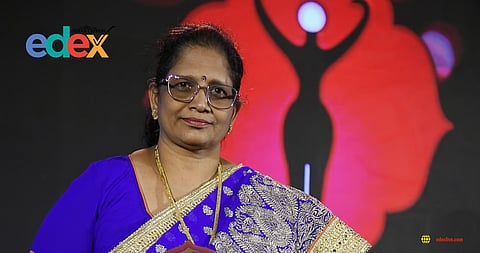

A pioneer in her field, she is the first woman to establish a Skin Bank at Osmania Hospital, a life-saving initiative that has transformed burn care in Telangana. Dr Palukuri Lakshmi, head of the department of Plastic and Reconstruction Surgery at Osmania Medical College, was honoured at the 34th edition of Devi Awards for her outstanding contribution to medicine and humanity. As she receives the prestigious recognition, CE speaks to her about her remarkable journey — from challenging surgeries to breaking myths about organ donation and building awareness around the vital role of skin banks.
“One of the most difficult cases I’ve handled involved a seven-year-old boy who suffered severe burns to both lower limbs. His parents had passed away in an accident, and he was being raised by his grandmother and uncle. Tragically, while playing, some neighbour children threw a lit matchstick at him, causing deep burns that covered nearly 40% of his body. Usually, for burn cases, we take skin grafts from unaffected areas of the lower limbs — but in his case, both donor sites were also burned. This made it extremely challenging to cover the affected areas. His condition was critical, with haemoglobin as low as five, so we had to perform multiple blood transfusions, protein infusions, and administer high doses of antibiotics. Once he stabilised, we harvested skin grafts from his upper limbs and trunk and managed to heal one of his lower limbs through multiple procedures. For the remaining areas, we used skin from our skin bank. Later, we also took grafts from his scalp, combining them with the existing skin grafts. Eventually, the wounds healed completely. Today, that young boy is back in school; and seeing him smile again was the greatest reward for our entire team after four months of tireless effort,” Dr Lakshmi shared.
The doctor wants the society to rise above superstitions. “Many people still believe that donating organs might affect their rebirth or future existence, but that’s not true. If we truly believe in God, we must also believe that He ensures completeness in every soul. By donating organs, we are not losing something; we are continuing to live through others. Instead of allowing our bodies to be destroyed by cremation or burial, we can give life to 14–15 people by donating organs. Even after death, we can continue to make a difference. I appeal to everyone to come forward and donate the eyes and skin, immediately after death,” she appealed.
Right now, it is mostly educated individuals, especially those abroad, who are aware and willing to donate, informs Dr Lakshmi. “We need much more awareness about skin donation and the facilities available at Osmania. Our skin bank can store up to a thousand grafts, which are provided free of cost to burn victims at Osmania and Gandhi Hospitals. To expand this effort, other hospitals need to establish MoUs with Osmania to access skin bank services. Going forward, we hope to develop satellite centres across the state with the help of NGOs and the government,” she shared.
But like every field, Dr Lakshmi’s was no different. “When I took charge, I saw it as an opportunity to make a difference — not just administratively but academically and socially. We organised the National Burn Conference at Osmania, in collaboration with the Plastic Surgery and Burns Associations. Every step reinforced my belief that leadership is not about authority; it’s about purpose and progress,” she noted.
